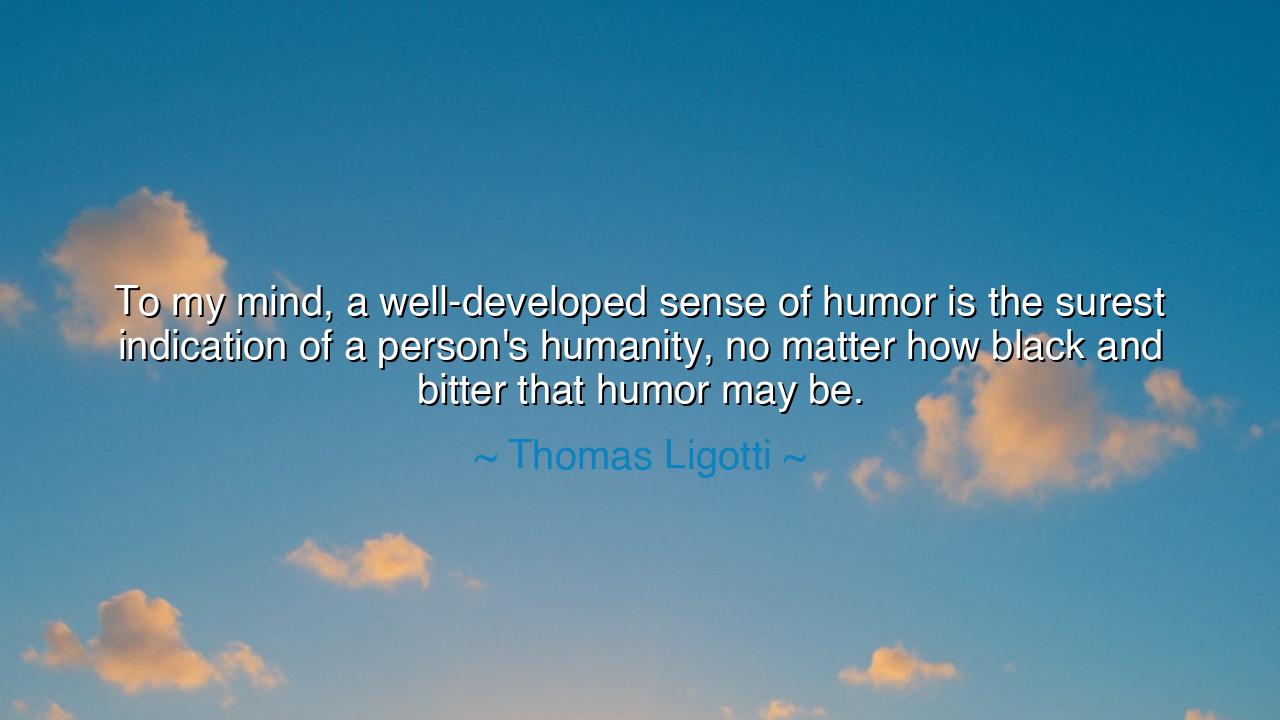
To my mind, a well-developed sense of humor is the surest
To my mind, a well-developed sense of humor is the surest indication of a person's humanity, no matter how black and bitter that humor may be.






In the grand tapestry of human existence, where light and darkness are woven together, there is one quality that stands as a profound testament to a person’s very humanity—and that is the gift of humor. Thomas Ligotti, in his deep and often unsettling understanding of the world, speaks to this truth when he says, "To my mind, a well-developed sense of humor is the surest indication of a person's humanity, no matter how black and bitter that humor may be." This observation, rich with wisdom, carries within it a profound reflection on the nature of laughter—that it is not just a response to joy, but a response to the absurdity and suffering inherent in life.
In the ancient world, humor was often seen as a reflection of the soul—the core of one’s being. The great Greek philosophers like Socrates and Aristotle recognized that true wisdom was often laced with irony and humor. Socrates, in his dialogues, would often engage in playful questioning that revealed the flaws in his interlocutors’ reasoning. But this humor, sharp and sometimes uncomfortable, was not intended to mock, but to illuminate the human condition. Just as Socrates used humor to reveal the limitations of human knowledge, so too does Ligotti suggest that a well-formed sense of humor—a humor that sees both the light and the dark, the tragic and the absurd—is a sign of deep humanity. For to laugh at the grief and absurdities of life is to acknowledge them without denying their reality.
Ligotti’s view of black humor—humor that is dark, bitter, and tragic—calls us to look deeper into the complexity of the human experience. The great writers and philosophers of antiquity, such as Plato and Heraclitus, understood that life is full of contradictions—moments of joy intertwined with sorrow, and moments of tragedy tempered by irony. In the story of Heraclitus, for instance, he famously said, "Character is destiny," and through his paradoxical wisdom, we understand that our reactions to life's difficulties often reveal our true nature. Humor, then, in its darkest form, is a mirror that reflects the depths of the human spirit, recognizing not just the light of existence, but the suffering we must all face.
The great playwrights of ancient Greece, such as Sophocles and Aristophanes, used humor not just to entertain, but to reveal the truths about human nature. Sophocles, in his Oedipus Rex, created a tragedy that, while deeply sorrowful, also contains a kind of ironic humor—the blindness of Oedipus, who struggles to uncover the truth, becomes a deeply human moment. Similarly, Aristophanes’ comedies, filled with sharp wit and satire, often pointed out the absurdities of the gods and of society itself. The humor in these works is not about light-hearted laughter, but rather a recognition of the contradictions of life, where joy and suffering exist side by side, and where the act of laughing becomes both a response to and a revelation of those contradictions.
Consider the ancient epic of Homer, where the great heroes, such as Achilles and Odysseus, experience both the grandeur of battle and the absurdity of their own flaws. Achilles, the great warrior, is capable of both fury and compassion, and his humor, though rare, often underscores his humanity. His moments of irony, in the midst of warfare, reveal the absurdity of human pride and fatalism. In this way, Ligotti’s reflection on the humanity of humor becomes even clearer—humor that is dark or bitter does not diminish our humanity, but in fact, illuminates it. It reveals that we are not perfect, but fragile, and that our strength lies not in denying our flaws, but in embracing them with a laugh, a wry smile, or a knowing sigh.
The lesson we must glean from Ligotti’s insight is that humor—especially dark humor—is an essential part of being human. It teaches us not to shy away from the difficult, the uncomfortable, or the painful aspects of life, but to embrace them with an open heart and a knowing laugh. In our own lives, we must learn to laugh at the absurdity of our struggles, our imperfections, and our contradictions. This does not mean we should dismiss pain or suffering, but rather that we should recognize these aspects of life as part of the human experience—a rich, complex tapestry that deserves both our reflection and our laughter. For it is through humor, especially the kind that acknowledges the darkness of life, that we connect with others and find meaning in even the most difficult moments.
So, let us embrace the humanity of dark humor in our own lives. Let us understand that to laugh at life’s absurdities and imperfections is not to belittle them, but to find strength in the recognition of our shared vulnerability. Like the great thinkers and writers of the past, we must learn to laugh at the contradictions of our existence, seeing in them not just sorrow, but a deeper understanding of what it means to be alive. For in the end, humor—especially the kind that is born from the darkness of life—does not diminish our humanity, but strengthens it, revealing the resilience, compassion, and wisdom that reside in every human heart.






AAdministratorAdministrator
Welcome, honored guests. Please leave a comment, we will respond soon